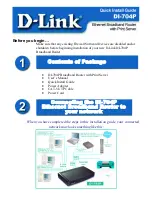
Chapter 1: Product description
Wireless operation
Page 1-12
•
An indoor power supply module providing Power-over-Ethernet (PoE) supply to ODU (AP/SM/BH)
•
Antennas and antenna cabling: Connectorized ODUs require external antennas connected using RF cable
•
Ethernet cabling: All configurations require a copper Ethernet Cat5e connection from the ODU (Ethernet port)
to the PoE
•
Lightning protection unit (LPU): LPUs are installed in the ports copper drop cables to provide transient voltage
surge suppression
•
Surge Suppression: The 600SS and 1000SS Surge Suppressor provides a path to ground
(Protective Earth) that protects connected radio equipment from near-miss lightning strikes.
•
Ground cables: ODU, LPUs and outdoor copper Ethernet cables are bonded to the site grounding system using
ground cables.
For more information about these components, including interfaces, specifications and Cambium part numbers,
refer to
Chapter 2: System hardware
.
Wireless operation
This section describes how the PMP/PTP 450 platform wireless link is operated, including modulation modes, power
control and security.
Time division duplexing
The system uses Time Division Duplexing (TDD) – one channel alternately transmits and receives rather than using
one channel for transmitting and a second channel for receiving. To accomplish TDD, the AP/BHM must provide
sync to its BHS. Furthermore, collocated APs/BHMs must be synced together – an unsynchronized AP/BHM that
transmits during the receive cycle of a collocated AP/BHM can prevent a second AP/BHM from being able to decode
the signals from its APs/BHSs. In addition, across a geographical area, APs/BHMs that can “hear” each other benefit
from using a common sync to further reduce self-interference within the network.
Modules use TDD on a common frequency to divide frames for uplink (orange) and downlink (green) usage, as
shown in the figure below.
For more information on synchronization configuration options, see
GPS synchronization
on page
2-37
.
Summary of Contents for PMP/PTP 450i Series
Page 31: ......
Page 55: ...Chapter 1 Product description Page 1 13...
Page 118: ...Chapter 3 System planning Typical deployment Page 3 2 Chapter 3 Figure 28 Wall installation...
Page 119: ...System planning Typical deployment Page 3 3...
Page 120: ...Chapter 3 System planning Typical deployment Figure Page 3 4 29 Roof installation...
Page 121: ...Chapter 3 System planning Typical deployment Figure Page 3 5 30 GPS receiver wall installation...
Page 123: ...Chapter 3 System planning Typical deployment Figure Page 3 7...














































